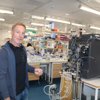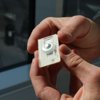-

The art of building a biologic drug
The first biosimilar from Xbrane Biopharma was launched earlier this year, and several more are under development at the company’s facility in Solna, Sweden. “We do everything in-house ‒ from DNA fragments to a final process,” says David Vikström, Chief
-

Vd för life science-företag vinner entreprenörspris
Isabell Ahlén, vd för bolaget Sam Nordic, vann priset ”Entrepreneurial Winning Women” under årets regionfinal av Ey Entrepreneur Of The Year i Stockholm.
-

Tirzepatide approved for obesity by the FDA – to be branded as Zepbound
Diabetes drug tirzepatide has now also been approved in the US for treating obesity.
-

Uppsalabo vann postdok hos Astra Zeneca i internationell tävling
Nu står det klart att alla åtta finalister i Astra Zenecas tävling Postdoc Challenge tilldelas en postdoktors-tjänst hos läkemedelsföretaget. En av vinnarna är Uppsalabon Javier Aguirre Rivera.
-

The first drugs to slow down Alzheimer’s – but what does it mean for patients?
New treatments for early Alzheimer’s are bringing hope to thousands of patients and their families. The question is, who will get the treatment, how will the right patients be found in time, and will the healthcare system’s resources be sufficient? Life Science Sweden has spoken to Swedish researchers in Alzheimer’s who voice cautious hope but also see further challenges.
-

Han kan vinna en postdok hos Astra Zeneca
På torsdag ska Uppsalabon Javier Aguirre Rivera presentera ett forskningsförslag i Cambridge inför en jury med förhoppningen om att vinna en betald postdok hos Astra Zeneca. Hans målsättning är att hjälpa till att effektivisera mRNA-baserade terapier till sjukdomar som idag inte har något botemedel.
-

From the sea of Åland to a self-test for lithium
Four years ago, a meeting on the sea of Åland resulted in the development of a self-test for lithium levels in the blood. The hopes are that the test will be available for individuals with bipolar disorder in the future.
-

Why the world renown researcher Marc Tessier-Lavigne resigns as Stanford´s president
In mid-summer, neuroscientist Marc Tessier-Lavigne announced his resignation as President of Stanford following allegations of manipulated study data. According to the reporter Theo Baker, who first reported the story, Tessier-Lavigne “rewarded the winners and punished the losers”. Here is the background of the story which has shaken the American scientific community over the summer.
-

Gothenburg-based company acquired by Norwegian diagnostics group
Gentian Diagnostics acquires Gothenburg-based Getica.
-

Vinnova is going to establish a new innovation cluster
Vinnova, the Swedish Agency for Innovation Systems, has been commissioned by the government to establish a national innovation cluster for advanced medicines.
Få tillgång till allt innehåll på Life Science Sweden
Ingen bindningstid eller kortinformation krävs
Redan prenumerant? Logga in
Gäller endast personlig prenumeration.
Kontakta oss för en företagslösning.